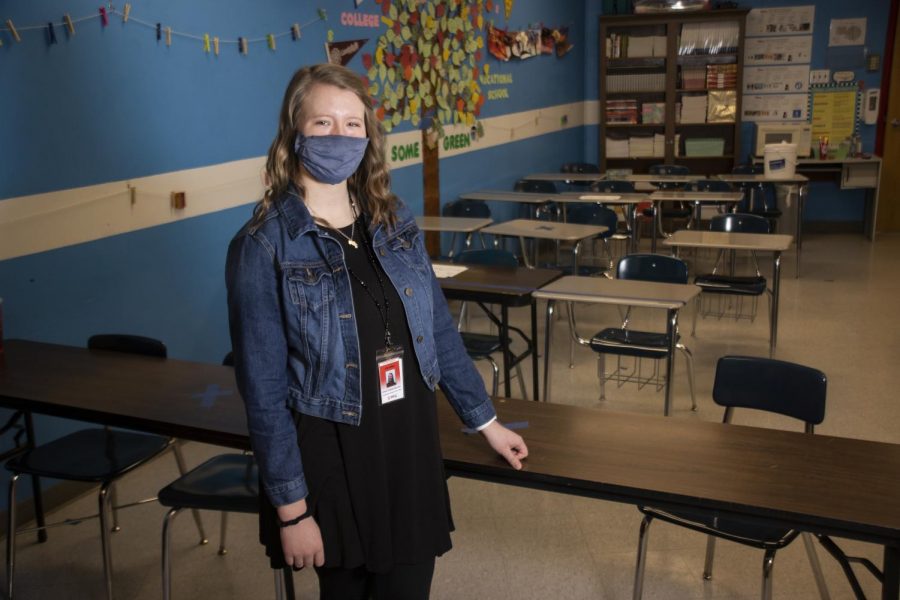How WKU’s student teachers are adapting
February 9, 2021
Along with countless other experiences interrupted by the pandemic, student teaching had to make a quick shift to remain an educational experience.
Student teaching for college students majoring in some form of educational studies is meant to give them practical experience working in the classroom with children every day. This semester, however, student teachers may not be in the classroom as much as in years past.
Not all student teachers experience the same thing because it is up to the school boards to decide if they meet in person or online. Many work on hybrid schedules, meaning some days they are in the classroom and other days they are teaching virtually.
Lilly Golden, a senior from HenryCounty, is majoring in English for secondary teachers and minoring in teaching English as a second language. She is currently a student teacher at the GEO International High School, the only international school in Kentucky.
Golden said student teaching so far has met her expectations because she figured things would be different due to the pandemic. She sees her students every other day. They can’t force their students to attend online classes because they do not all have the best WiFi. On in-person days, the students get the work they do on the non-traditional instruction days.
On the NTI days, Golden stays available to meet with the students virtually if they need any assistance. She said there are several differences between teaching online and in person, not all of them positive.
“I don’t like teaching online,” Golden said. “I always make a slide presentation, I fill out the lesson plan, and I record myself going through it. I always mess up and then redo it 100 times. If I’m in front of kids, I just feel like it’s more natural.”
Golden also prefers in-person instruction because there is accountability with her students. She can make sure they are doing their work and understanding the material.
Golden did say, however, that she thinks the experience will be beneficial in the long run.
“I know how to use technology, I know how to explain things to people who are out, I know how to be flexible when everything gets thrown at me,” Golden said. “I think that’s really the benefit of it.”
Student teachers shadow a mentor teacher at their assigned school and are paired with a supervisor to oversee and evaluate their work. Jan Casada
is a supervisor for several students at WKU.
For a student teacher to become certified, they have to be observed
by their supervisor four times and complete 70 instructional days. Casada said these observations will all be virtual, so she has to really pay attention and recognize she isn’t seeing the full picture.
“I have to realize that there’s going to be situations that are completely out of the student teacher’s hands,” Casada said. “For example, let’s say that they’re working with virtual students and there’s noise in the background from a younger sibling or parent. I have to just take my mind off of that.”
Casada said she tries to focus on the things the student teachers can actually improve, like questioning and discus- sion techniques, because NTI instruction makes certain aspects of student teaching like classroom management less important.
This was something she had to learn when schools first went online.
“It was one of those experiences that no one could have even predicted could happen,” Casada said. “I really did feel sorry for student teachers during that time because their mentor teachers never experienced this.”
Katie Jo Serrano, an 8th grade math teacher at Bowling Green Junior High, was a student teacher last spring when schools went online. She said no one knew what was going to happen after they heard the news.
“I saw the kids on March 12,” Serrano said. “We were like ‘see you Monday,’ and then we got the call we were never going to see them in class again.”
After March 13, she would mainly assist the teacher from home by communicating with parents about how to moderate their children’s learning. She said the experience made her realize what is really important.
“It made you rethink what you thought about education,” Serrano said. “And it made you reflect on what’s important, why am I teaching, and what does it mean to go to school.”
Stephanie Martin, director of professional educator services at WKU, said the Educational Professional Standards Board, which makes the qualifications for educators, has made changes to their regulations to adapt to student teaching during the pandemic.
While the EPSB used to require supervisors to observe student teachers in person, that is no longer necessary. They have also become more lenient about the 70 instructional days because of hybrid schedules and the chance of student teachers getting COVID-19.
If student teachers contract the virus, they are allowed to work from home. If they are too sick to work, they have to make up the days at the end of the semester, Martin said.
One of the biggest changes from the EPSB is that student teachers are allowed to apply for substitute teaching positions that count towards their 70 instructional days. Before, student teachers could not be paid to teach. Because most substitute teachers are older and retired, many have decided not to work for fear of being exposed to the virus, causing a shortage of substitute teachers.
“[Student teaching] is like a full-time job and they never get paid,” Martin said. “This is kind of nice that they can make money.”
Martin said that in the long run, this experience will greatly benefit the student teachers.
“I think school is forever going to change,” Martin said. “I could see being virtual and having that skill set is going to be helpful to our student teachers.”
Managing Editor Ellie Tolbert can be reached at [email protected]. Follow her on Twitter @eleanortolbert4.
























